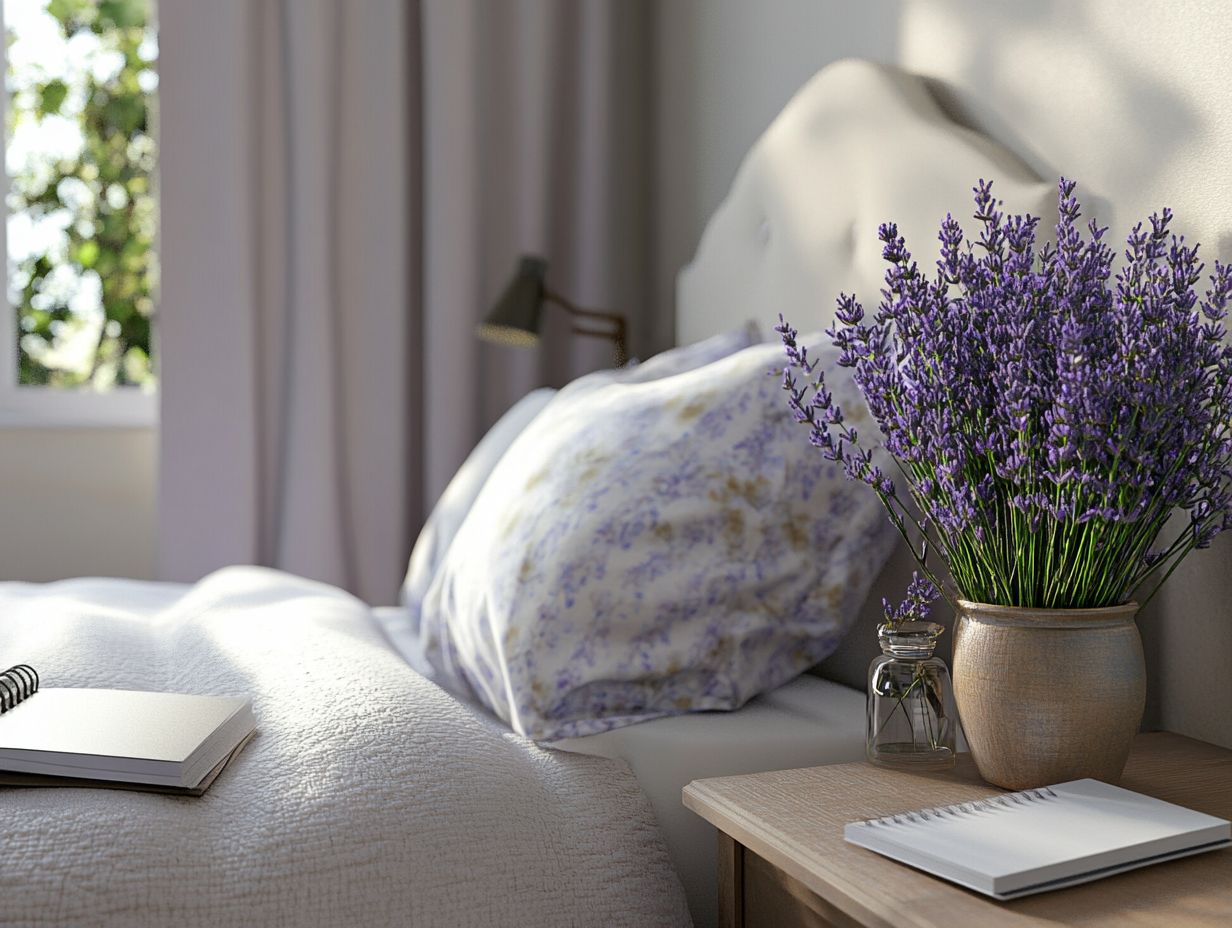5 Homeopathic Tips for Better Sleep
Struggling to catch those elusive Z’s? You re certainly not alone in this. In today s fast-paced world, many people have trouble sleeping.
This article delves into five effective homeopathic tips designed to enhance your sleep quality. You ll discover the importance of establishing a calming bedtime routine and the invaluable benefits of homeopathic remedies. It s packed with practical strategies to help you drift off peacefully.
By the end, you ll walk away with a toolkit of natural solutions to reclaim those restful nights and awaken feeling refreshed. Don t wait! Start your journey to better sleep now!
Contents
- Key Takeaways:
- 1. Establish a Sleep Routine
- 2. Avoid Stimulants Before Bedtime
- 3. Create a Relaxing Environment
- 4. Try Natural Sleep Aids
- 5. Consider Homeopathic Remedies
- What Is Homeopathy and How Does It Work?
- What Are the Key Principles of Homeopathy?
- Frequently Asked Questions
- What are 5 homeopathic tips for better sleep?
- Is homeopathy safe for treating sleep problems?
- How long does it take for homeopathic remedies to work for sleep problems?
- Can homeopathy be used as a standalone treatment for sleep problems?
- Are there any side effects of using homeopathy for better sleep?
- Can homeopathy be used for children with sleep issues?
Key Takeaways:

A consistent sleep routine boosts sleep quality and helps regulate the body’s natural sleep-wake cycle.
Avoiding stimulants such as caffeine and electronics before bedtime promotes relaxation and better sleep.
Creating a calming environment with low lighting and soothing scents aids in falling asleep and staying asleep.
1. Establish a Sleep Routine
Establishing a consistent sleep routine is essential for improving your sleep quality and regulating your sleep cycle. It signals to your body when it s time to sleep and when it s time to wake up.
Your routine could include relaxing activities like drinking warm milk or chamomile tea, taking time to unwind, and creating a sleep environment with the right temperature for relaxation.
Incorporating regular exercise into your day can significantly boost both your emotional and physical health, paving the way for improved sleep patterns and fewer sleep issues.
Creating a sleep routine isn t just about what you do before bed; it s also about timing. Setting a specific bedtime and wake-up time even on weekends helps maintain the natural rhythm your body craves.
Engaging in calming activities before bed, such as reading or practicing relaxation techniques while limiting screen exposure, allows your brain to prepare for rest.
Don t underestimate the power of natural light during the day. It not only boosts your mood but also increases melatonin production, signaling when it s time to unwind. Mood stability and physical wellbeing play critical roles in your sleep quality.
By managing stress and maintaining a balanced lifestyle, you can achieve deeper, more restorative sleep.
2. Avoid Stimulants Before Bedtime
Avoiding stimulants like caffeine, nicotine, and certain medications before bedtime is crucial for overcoming sleep troubles and minimizing insomnia. These substances can disrupt your natural sleep aids and melatonin levels, which is a hormone that helps regulate sleep.
Caffeine, commonly found in coffee, tea, and energy drinks, can linger in your system for hours, making it particularly disruptive if consumed later in the day. Nicotine, often present in cigarettes and vaping products, serves as a potent stimulant that can delay your sleep onset and diminish the quality of your deep sleep phases.
Some over-the-counter medications and specific prescriptions can unintentionally stimulate your nervous system, complicating your quest for restful sleep.
It’s essential to recognize that these stimulants don t just interfere with sleep; they can also heighten feelings of stress and anxiety, creating a vicious cycle that exacerbates emotional distress and contributes to persistent sleep issues.
By grasping this relationship, you can more effectively tackle both your emotional health and sleep quality.
3. Create a Relaxing Environment
Creating a relaxing environment is essential for enhancing your sleep quality. Factors like the ideal temperature, light exposure, and calming scents can significantly impact your ability to both fall asleep and stay asleep throughout the night.
Your bedroom should ideally maintain a cool temperature, typically between 60 and 67 degrees Fahrenheit, to foster a restful night. Managing light exposure is equally important; using blackout curtains or dimmable lights can help cultivate an inviting atmosphere that signals to your body it s time to wind down.
You might find that incorporating elements like aromatherapy with essential oils such as lavender or chamomile can further enhance your sense of tranquility. Practices like meditation and gentle yoga not only alleviate stress but also set a soothing tone, preparing your mind and body for a peaceful slumber.
Together, these supportive routines contribute to a more restorative sleep experience, allowing you to wake up refreshed and revitalized.
Take charge of your sleep today for a brighter tomorrow!
4. Try Natural Sleep Aids

If you re grappling with sleep troubles, consider exploring natural sleep aids like warm milk, chamomile tea, and tart cherry juice. These remedies promote relaxation and improve your sleep pattern.
Melatonin helps signal to your body that it s time to sleep. Valerian root, known for its calming properties, has been used for centuries to ease anxiety, setting the stage for a more restful night.
Incorporate foods rich in tryptophan, such as turkey and bananas, to boost serotonin production, which enhances your mood and supports better sleep.
Make sure you get enough magnesium in your diet, as it helps reduce muscle tension and fosters relaxation, making it easier to drift off into a peaceful slumber.
5. Consider Homeopathic Remedies
Considering homeopathic remedies could be the perfect solution for your sleep troubles. These approaches focus on individualized treatment methods that tap into your body’s natural healing powers, utilizing substances like valerian root and passionflower.
Unlike conventional treatments that often rely on synthetic medications with potential side effects, homeopathy uses highly diluted natural substances designed to activate your body’s own healing response. For example, chamomile is well-known for its calming effects, while Arsenicum album could be just what you need for anxiety-induced insomnia.
By recognizing your unique symptoms and experiences, these remedies can be customized to support various conditions, whether you re dealing with occasional sleeplessness or chronic insomnia. Many find that homeopathic options not only provide relief from restless nights but also foster overall well-being without the worry of dependency.
What Is Homeopathy and How Does It Work?
Homeopathy is a holistic healing approach that uses minute doses of natural substances to awaken your body’s inherent healing capabilities. Its purpose is to restore both emotional and physical health while addressing a range of conditions, including sleep issues.
This method is based on the principle that like cures like meaning that a substance that can cause symptoms in a healthy person can, in very tiny amounts, alleviate similar symptoms in someone unwell. By taking into account your unique emotional and physical states, homeopathy offers a tailored framework for treatment.
If you struggle with sleep disturbances, homeopathy presents gentle alternatives to conventional sleep aids, working with your body s natural rhythms to promote restorative slumber.
Practitioners emphasize the interconnectedness of mind and body, focusing on both emotional and physical aspects to ensure a comprehensive approach to your overall well-being.
What Are the Key Principles of Homeopathy?
The key principles of homeopathy center around individualized treatment and the use of natural remedies, where your unique symptoms guide the selection of appropriate homeopathic substances.
By embracing the foundational principle of “like cures like,” practitioners seek remedies that mirror your specific symptoms, fostering a more harmonious healing experience.
The law of minimum dose emphasizes the potent effects of treatments administered in small amounts, enhancing efficacy while reducing potential side effects.
For sleep issues, such as insomnia or restless legs, these principles encourage practitioners to tailor remedies that resonate with your emotional and physical state.
This thoughtful approach not only promotes effective relief but also deepens the understanding of what contributes to your sleep disturbances, leading to a more comprehensive and personalized treatment plan.
What Are the Different Types of Homeopathic Remedies?

Homeopathic remedies provide a variety of natural options. These include plant extracts like valerian root and passionflower, as well as essential minerals that target specific sleep disturbances.
Chamomile is well-known for its calming effects. It is often recommended for those struggling with sleep due to anxiety.
Magnesium is also important for muscle relaxation. It greatly enhances your overall sleep quality.
Another effective remedy is 5-HTP, a natural amino acid that can boost serotonin levels and promote tranquility. By adding these to your nightly routine, you may find it easier to drift off and wake up feeling refreshed.
How Can Homeopathy Help with Sleep Issues?
Homeopathy takes a gentle approach to sleep issues by addressing their root causes. This method enhances your emotional well-being and promotes better sleep.
It considers your unique symptoms, allowing for personalized treatments for concerns like insomnia and restless leg syndrome.
For example, a woman struggled with sleep disruptions caused by anxiety. After visiting a homeopathic practitioner, she received a remedy that eased her anxiety and improved her sleep.
Unlike conventional medications, which may have side effects, homeopathic remedies offer a safe and sustainable alternative. They are ideal for anyone looking for long-term solutions to sleep disturbances.
Are There Any Risks or Side Effects of Homeopathic Remedies?
Homeopathic remedies are generally safe. However, it s important to be aware of potential risks, especially when using them alongside conventional treatments.
Some people may experience mild side effects, like stomach upset or headaches, when starting a new remedy. Interactions with other medications can also complicate existing health issues.
Always consult with a healthcare professional before starting any homeopathic remedy. This is especially critical if you are on medication or have pre-existing health conditions.
How Can One Incorporate Homeopathy into Their Daily Life for Better Sleep?
Incorporating homeopathy into your routine for better sleep is straightforward. Start by selecting the right remedies and adjusting your environment.
Choose remedies that fit your needs for relaxation and restful sleep. Pair this with calming pre-sleep rituals like reading or enjoying herbal tea.
Create a serene sleep environment, free from distractions. Practicing mindfulness or gentle yoga during the day can also enhance your sleep quality.
Frequently Asked Questions

What are 5 homeopathic tips for better sleep?
1. Establish a regular sleep schedule. Going to bed and waking up at the same time each day helps regulate your body’s clock and improves sleep quality.
2. Avoid stimulants before bedtime. Caffeine, alcohol, and nicotine can disrupt your sleep cycle, so steer clear of them in the hours before bed.
3. Try relaxation techniques. A hot bath, calming music, or deep breathing exercises can relax your mind and body.
4. Use natural remedies. Herbs like chamomile, valerian, and passionflower are known for their calming effects. You can take them in tea or supplement form for better sleep.
5. Consult a homeopath. A trained homeopath can suggest personalized treatments for your sleep issues based on your symptoms and health history.
Is homeopathy safe for treating sleep problems?
Yes, homeopathy is a safe, gentle alternative medicine for sleep issues. These remedies are made from natural substances and are highly diluted, ensuring they are non-toxic and side-effect free.
How long does it take for homeopathic remedies to work for sleep problems?
The time it takes for remedies to work varies by individual and the severity of sleep issues. Some may feel better in a few days, while others may need several weeks. Patience and consistency are key!
Can homeopathy be used as a standalone treatment for sleep problems?
Homeopathy can effectively treat sleep problems alone. However, combining it with lifestyle changes like a regular sleep schedule and relaxation techniques is often recommended. A homeopath can help create a treatment plan tailored to your needs.
Are there any side effects of using homeopathy for better sleep?
Homeopathic remedies are generally safe with no known side effects. Always consult a trained homeopath and disclose any current medications or supplements to avoid interactions.
Can homeopathy be used for children with sleep issues?
Yes, homeopathy is safe for children with sleep issues. It can be tailored to their needs. Always consult with a trained homeopath for the proper dosage and treatment options.






